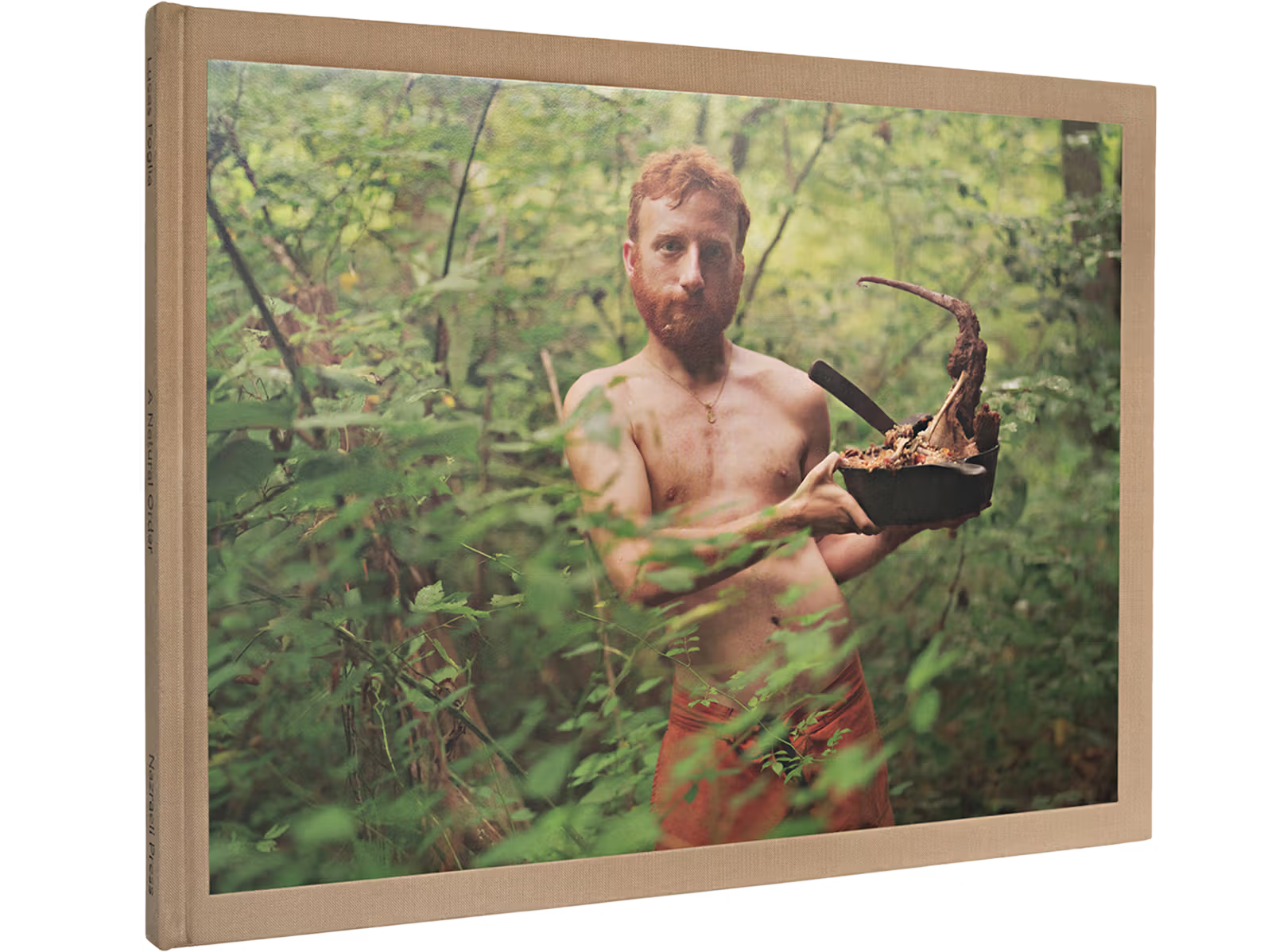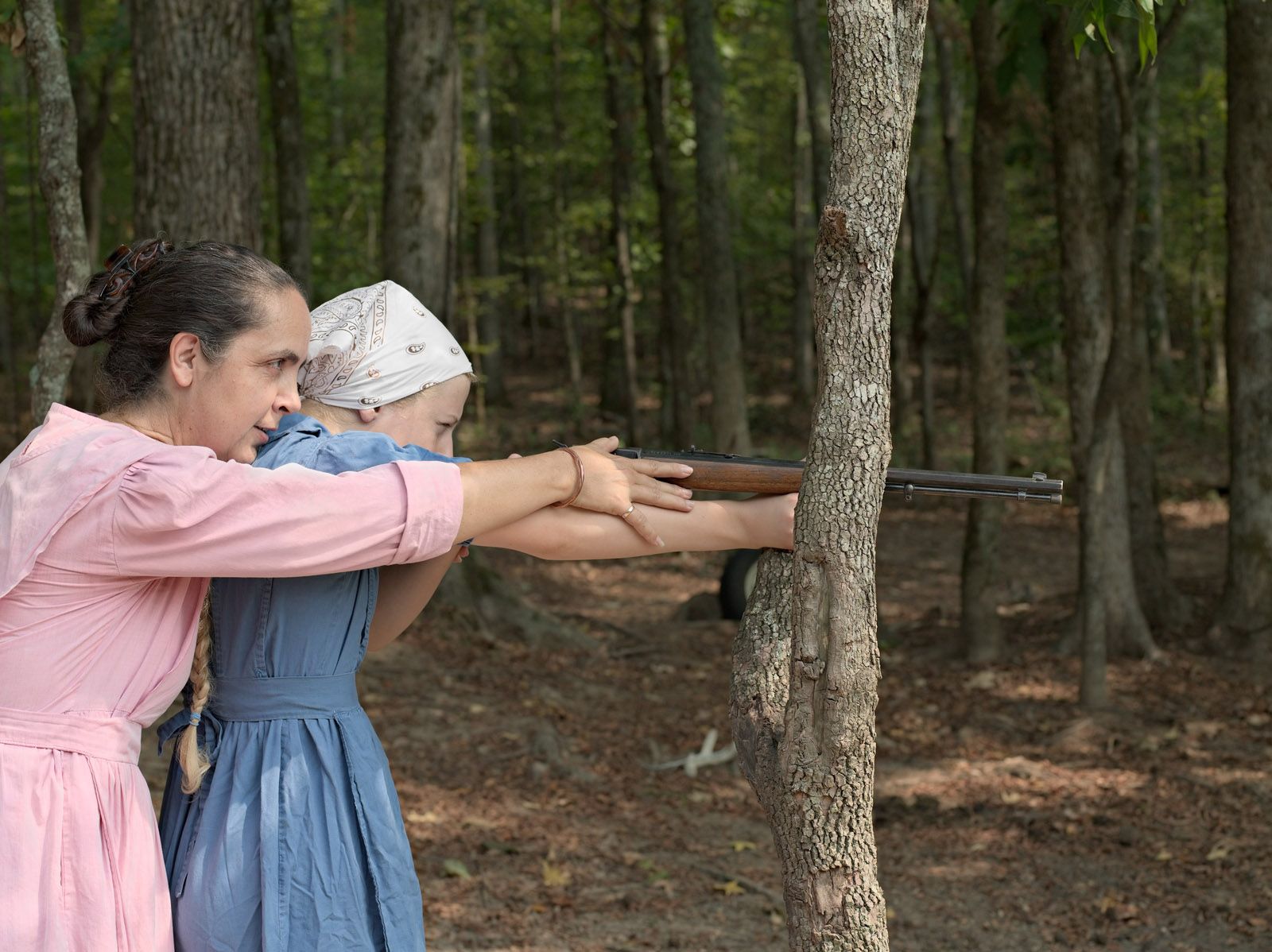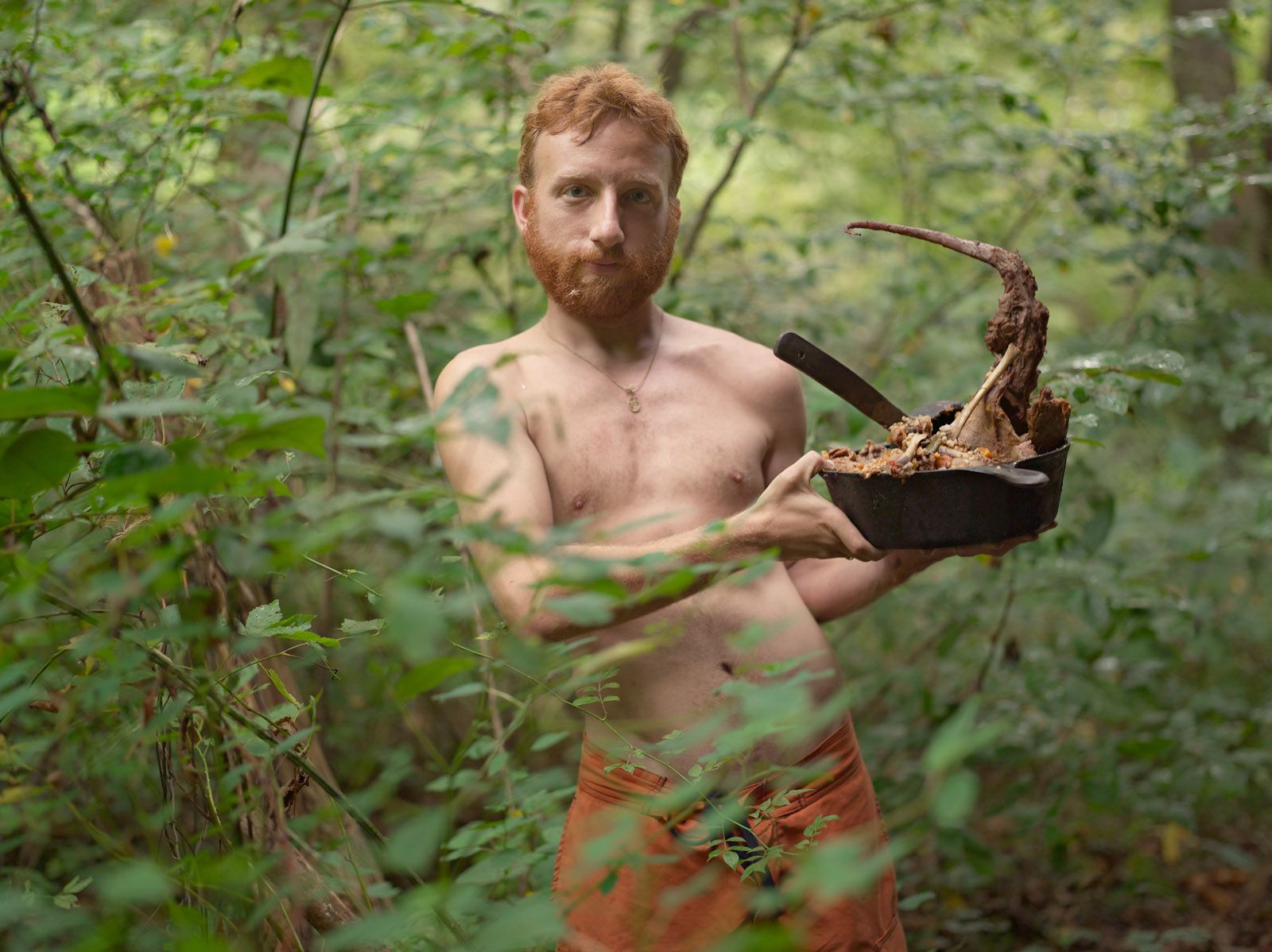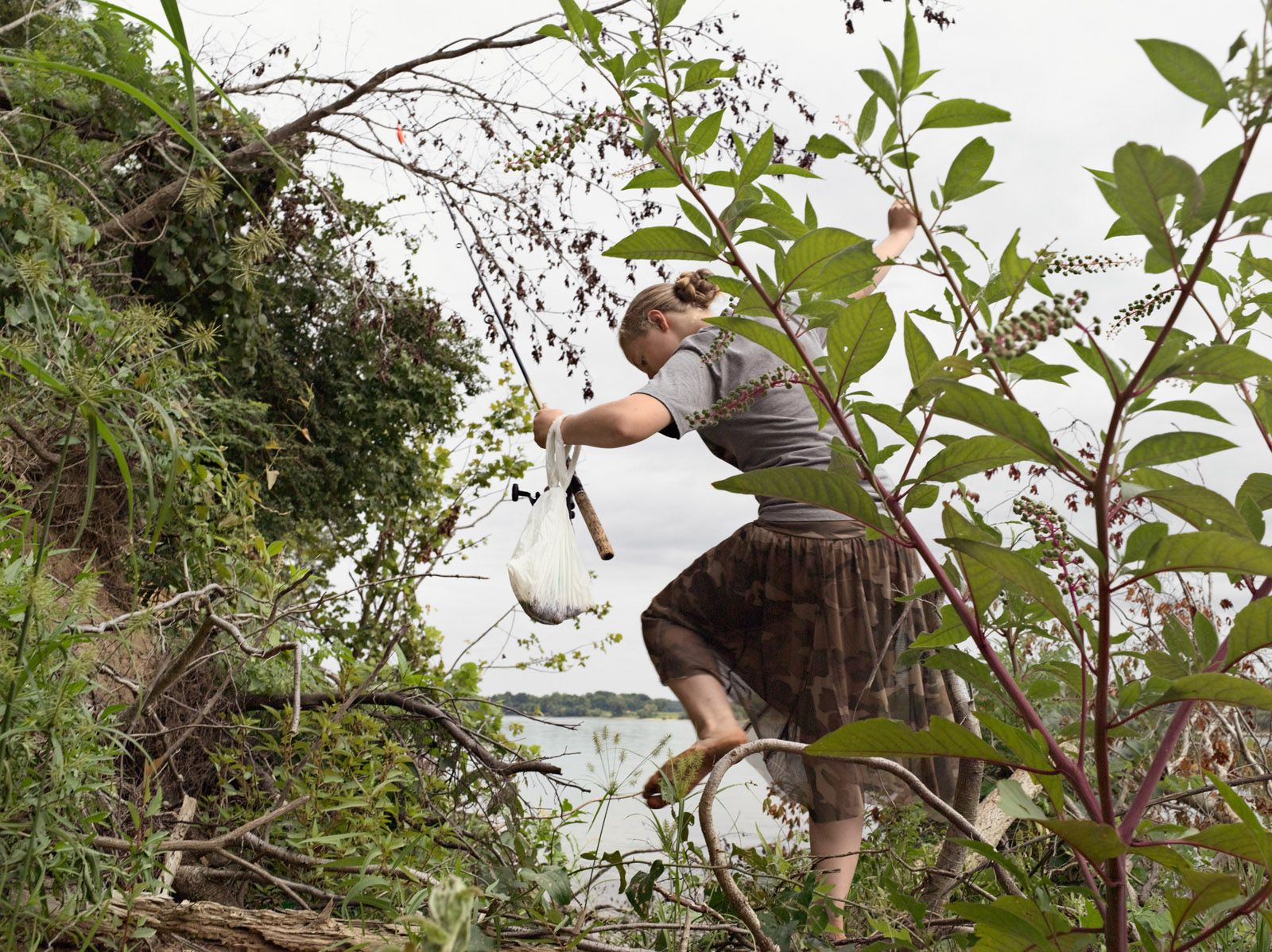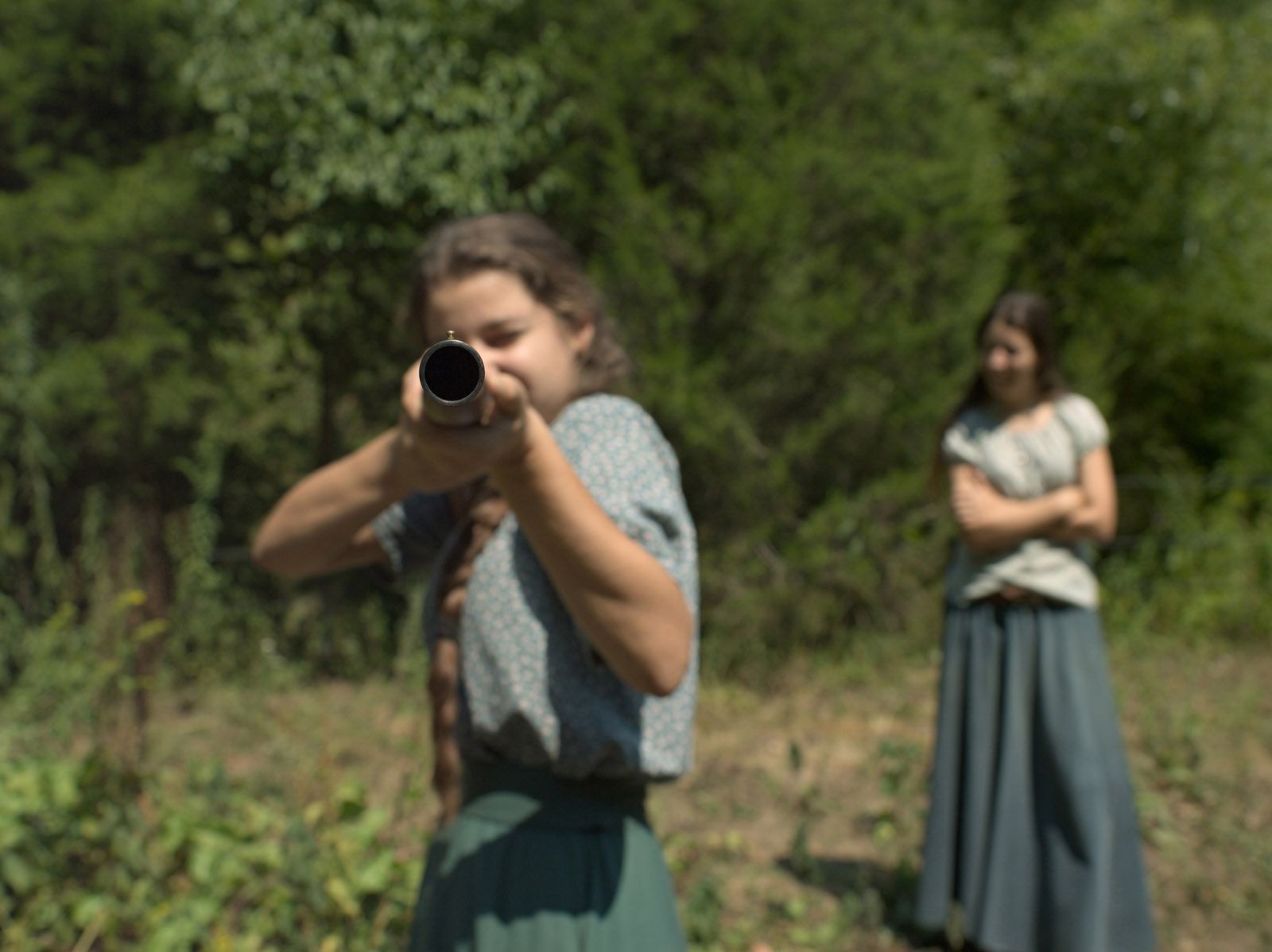Published by Nazraeli Press
Exhibition at Galerie du Jour. agnès b., France
Cora in a Realtree Camouflage Dress, Tennessee 2008
"Have you read the Scripture? Satan is bringing all humankind into bondage through the international banking system. I relinquished my driver’s license and my Social Security number. I stopped banking. You can’t number us. You can’t treat us like that, because we’re not part of that system." –Conrad
Desk, Sassafras Community, Tennessee 2009
Natalie’s Wattle and Daub House, Wildroots Homestead, North Carolina 2010
"Of course it’s not perfect, but it’s the closest that I’ve ever seen when it’s functioning... we’re getting most of our food from the land and living mostly outside, getting to know the natural materials of our area—what we can make shelter out of, what we can eat, what we can make medicine out of. We are coming to understand how it’s possible to live without civilization." –Natalie
Woodcutting, Russell Creek Community, Tennessee 2010
Russell Creek is a "plain community." The families who live there are Christian, but without strict rules or a central leader like the Amish. Most of the families moved from suburbs or cities, and the community has a high concentration of former engineers.
Rita and Cora Aiming, Tennessee 2007
"When the banks go down, food is going to be number one. Next is guns and ammo. Then probably gas. And then medications. But they’ll be thinking, 'This is going to last six months, maybe..." We’re getting ready. We’re gathering lots of seeds. We can grow food. We figure we’ll probably end up feeding a lot of people." –Rita
Creek, Kevin's Land, Virginia 2009
Acorn with Possum Stew, Wildroots Homestead, North Carolina 2006
Cora Going Fishing on the Tennessee River, Tennessee 2009
Patrick and Anakeesta, Tennessee 2007
Natalie Carrying Firewood, Wildroots Homestead, North Carolina 2006
"I was nineteen when I left home to hitchhike and hop freight trains. Being a traveling kid is a pretty feral existence. You sustain yourself from day to day. How would I define feral? It’s basically when you go from a domesticated, civilized state to a more wild and natural existence. It’s not just being wild, it’s becoming wild—whether by choice and consciousness or through necessity." –Kaleb
National Geographic, Wildroots Homestead, North Carolina 2008
"The more I thought about what was wrong with the structure of our society, the more I felt like our biggest problems came from being disconnected from everything in our lives—from our clothes, from our food source and from the authorities and the power structures that influence our lives so heavily." –Kaleb
Pixie and Kyd's Duet, Falling Leaves Rendezvous, Georgia 2007
Pixie and Kyd rehearse at the Falling Leaves Rendezvous in rural Georgia. Hundreds of people gather there twice a year to learn to make fire without matches, harvest edible and medicinal plants, and use stone tools. Pixie didn't name her son until he was old enough to name himself. When he was four, he chose the name "Kyd."
Car Parts, Tennessee 2008
Lowell Cultivating with Pickup Truck and Ox Plow, Tennessee 2008
"One problem you run into is everybody’s kind of independent. Most people who are independent enough to try to live separate from worldly things are too independent to listen to each other. The Amish have it figured out. On Sunday afternoon, they decide what they’re going to do for the week. It’s just so much easier when you do things that way.” –Lowell
Scarecrow, Tennessee 2008
Bhajan Wrestling, North Carolina 2009
Nolan Scything the Lawn, Tennessee 2008
Jasmine, Hannah and Vicki Picking Jewelweed, Tennessee 2007
Victoria Bringing in the Goats, Tennessee 2008
"A milk goat is the most valuable thing you can have. They live off of nothing. They furnish you with milk. They furnish you with meat. Before long, you’ve got a herd of them. Take five milk goats and you can live anywhere in the world. With that and a sack of sweet potatoes, you’ve really got it made." –Lowell
Andrew and Taurin Drinking Raw Goat's Milk, Tennessee 2009
Andrew and his family believe in the coming of the Messiah. They’re raw foodists who moved across the United States looking for land to settle on, and eventually purchased a small plot in Costa Rica.
Watermelon Patch, Twin Oaks Community, Virginia 2009
Twin Oaks Community is an income-sharing community of approximately 100 people living on 450-acres in Louisa County, Virginia. Founded in 1967, it is one of the longest-enduring and largest secular intentional communities in North America.
Valarie and the Shadow, Tennessee 2008
Bear, Poisoned by Neighbors, Kevin's Land, Virginia 2008
"When I skinned my first raccoon, I cried. It looked so human. It was really hard. But it’s easy now. It’s interesting how that changes." –Natalie
Todd after a Haircut, North Carolina 2008
"There was this swarm of bees, forty feet up in a hickory tree. Todd and I cut a gap on either side of the tree so it went down slowly, and we were able to put the bees into our swarm box. That hive produced a bucket of honey between May and August. We stripped the tree's bark for baskets, and made tools from pieces of the wood. We used the rest for firewood. Sometimes things work neatly like that around here." –Doug
Fire Circle, Falling Leaves Rendezvous, Georgia 2008
Cardin in the Rain, Virginia 2006
Lee Going Hunting, Tennessee 2008
Sink, Wildroots Homestead, North Carolina 2006
"America is a land of such abundance that it’s really difficult not to survive, for an able-bodied individual. There’s an abundance of everything to be had for cheap or free if you’re willing to be resourceful about how you get it and what you do with it. And life feels so much freer and more spontaneous when you’re not working for someone, and when you’re not tied down to paying rent or mortgage..." –Kaleb
Lunea with Deer Rib, Kevin's Land, Virginia 2008
James Aiming, North Carolina 2007
Alex with Gourd, North Carolina 2008
Jasmine, Hannah and Cecilia Swimming, Tennessee 2008
Jasmine, Hannah, and Cecilia, moved off grid to the edge of the Russell Creek community after their mother went through a difficult divorce. They grow or barter for their food, and sing harmonies at churches across the region.
Venison for Canning, Tennessee 2008
"The last year I worked in business, I made over $250,000. The next year I made $3,600. It finally worked up to about $6,000. And we’re doing fine. You don’t spend money, so you don’t have bills." –Lowell
Family Portrait with the Photograph George Took of Christina at their Wedding, Tennessee 2008
George worked as a nuclear engineer in New Jersey and met his wife, Christina, at a motorcycle rally. After they became worried about the risks of nuclear technology and converted to the Christian Israelite faith, they moved with their children to a farm in rural Tennessee.
Homeschooling Chalkboard, Tennessee 2008
General Store, Tennessee 2008
Fish Cooked in Campfire Ashes, Falling Leaves Rendezvous, Georgia 2008
Tod’s Vegetable Oil Van, North Carolina 2006
"Over the years I’ve come to realize that most people are not going to radically change their lives. They just can’t, and it would be asking too much for them to do it. But they can take some steps in just teaching themselves to become a little more self-sufficient... if there’s any hope at all of being able to transition into a less chaotic life." –Talia
Harvest with Squirrel, North Carolina 2007
Mason Harvesting Hay, Kentucky 2008
Will after Leaving Cane Creek Community, Tennessee 2008
Cora and Wesley, Tennessee 2010
David in his Wigwam, Kevin’s Land, Virginia 2010
Gabriel, North Carolina 2007
Alex's Magnolia Leaf Rain Hat, North Carolina 2007
Cecilia with a Shotgun, Tennessee 2008
"The natural order of things is when a species gets dominant in its niche it overruns it completely to the point where it eats all of its food and then it crashes and burns. In my opinion, if we ever succeed in being sustainable, it will be the first non-natural thing we’ve ever done." –Frank
